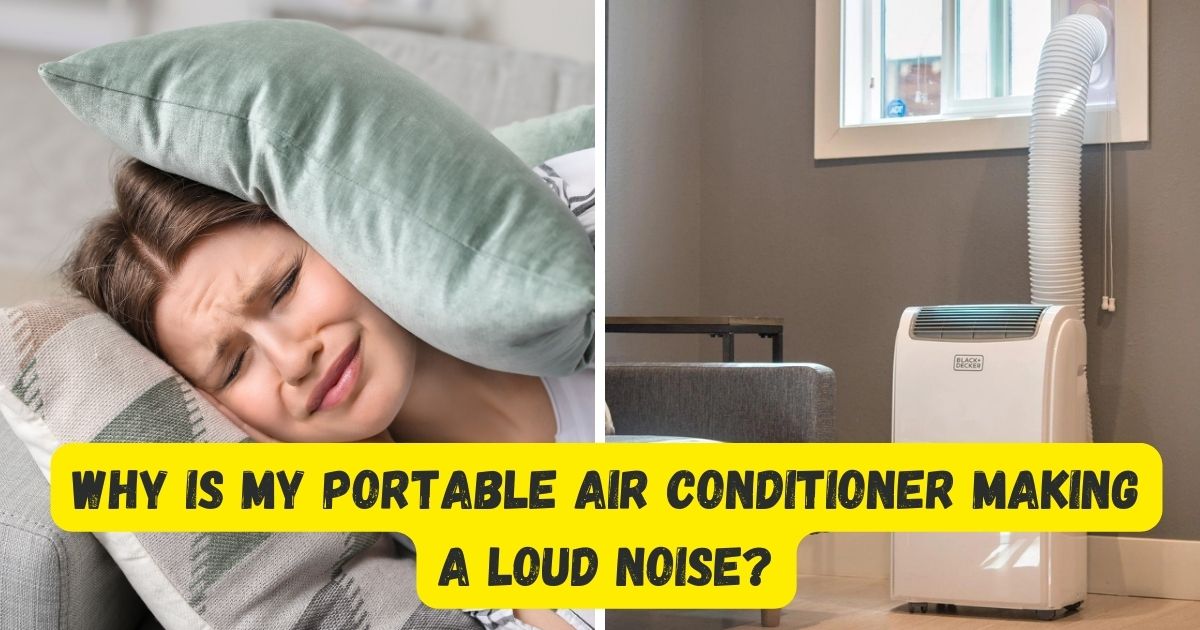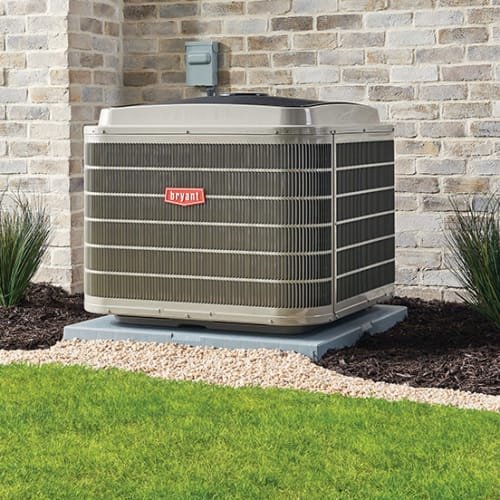Why Is My Portable Air Conditioner Making A Loud Noise? Troubleshooting Tips To Fix It Fast
A portable air conditioner may make a loud noise due to various reasons, such as a loose fan or motor, a malfunctioning compressor, or a clogged air filter. It is important to check and troubleshoot these issues to identify the exact cause and address it accordingly.
Are you enjoying the cool breeze of your portable air conditioner, but the loud noise it’s making is ruining the tranquility of your home? You’re not alone. Homeowners and renters alike have experienced this frustrating issue with their portable air conditioners, often struggling to identify the cause of the noise and find a solution to eliminate it.
In this blog article, we will explore the reasons why your portable air conditioner is making a loud noise and provide insights and solutions to help you regain peace and quiet in your living space. Whether you’re a beginner or have intermediate knowledge about how air conditioners work, we’ve got you covered.
From strange rattling sounds to annoying buzzing noises, we will delve into the various factors that contribute to the noise produced by portable air conditioners. We will also uncover common issues such as fan problems, compressor malfunctions, and vibration disturbances that can lead to amplified noise levels. But it’s not all doom and gloom.
We will guide you through troubleshooting techniques to pinpoint the source of the noise and offer practical tips to reduce or eliminate it. Our goal is to help you enjoy the benefits of a portable air conditioner without the headache of excessive noise. Say goodbye to interrupted sleep, disrupted conversations, and distractions caused by a loud portable air conditioner.
Understanding the Different Types of Portable Air Conditioners
Before we dive into the reasons why your portable air conditioner is making a loud noise, let’s take a moment to understand the different types of portable air conditioners available in the market. By having a clear understanding of the various types, you’ll be better equipped to identify the potential noise-related issues that may arise.
1. Window Air Conditioners
Window air conditioners are a popular choice for those looking to cool a specific room or space. These units are installed in a window frame, allowing them to expel heat and moisture outside while cooling the room’s interior. While they can be effective in cooling small to medium-sized spaces, window air conditioners can sometimes generate noise due to factors such as vibrations and fan speed.
2. Portable Air Conditioners
Portable air conditioners offer flexibility and convenience as they can be moved from one room to another. They typically consist of a unit with wheels that can be easily transported and a vent hose that needs to be connected to a window or vent for proper ventilation. Portable air conditioners can be noisy, especially if not properly maintained or if there are issues with the internal components.
3. Split Air Conditioners
Split air conditioners consist of two components – an indoor unit and an outdoor unit. The indoor unit is responsible for cooling the room, while the outdoor unit houses the compressor and condenser. Unlike window or portable air conditioners, split air conditioners are known for their quiet operation, as the noisiest components are located outside the room.
Common Causes of Loud Noise in Portable Air Conditioners

Now that we have a basic understanding of the different types of portable air conditioners, let’s explore the common causes of loud noise in these units. By identifying the root cause of the noise, we can take the necessary steps to fix the issue and restore peace and quiet to our living spaces.
1. Improper Installation
One of the most common reasons for a loud noise from a portable air conditioner is improper installation. If the unit is not installed correctly, it can lead to vibrations and rattling noises. Make sure to follow the manufacturer’s installation instructions carefully, including properly securing the vent hose and ensuring a tight seal between the unit and the window or vent.
2. Loose or Damaged Parts
A portable air conditioner contains various moving parts that can become loose or damaged over time. Loose fan blades, screws, or panels can create a rattling or buzzing noise. If you suspect that loose or damaged parts are causing the noise, it’s essential to inspect the unit and tighten or replace any components as necessary.
3. Dirty or Clogged Air Filters
Another potential cause of a loud noise in a portable air conditioner is dirty or clogged air filters. When the filters become dirty, airflow is restricted, causing the unit to work harder and produce excess noise. Regularly clean or replace the air filters according to the manufacturer’s recommendations to prevent this issue.
4. Fan Problems
The fan in a portable air conditioner plays a crucial role in circulating cool air throughout the room. However, if the fan blades are bent, loose, or damaged, it can result in loud clicking or scraping noises. Inspect the fan blades for any signs of damage and replace them if necessary.
5. Compressor Malfunctions
The compressor is responsible for compressing and circulating the refrigerant in the portable air conditioner. If the compressor is malfunctioning, it can generate loud noises such as banging or humming sounds. Compressor issues are more complex and may require professional assistance to diagnose and repair.
6. Vibration Disturbances
Vibrations are a common source of noise in portable air conditioners. The unit’s vibrations can resonate with the surrounding surfaces, amplifying the noise. Placing the unit on a stable and level surface can help reduce vibrations and minimize noise.
Troubleshooting Tips to Reduce Noise in Portable Air Conditioners
Now that we’ve identified some of the common causes of loud noise in portable air conditioners let’s explore troubleshooting tips to help reduce or eliminate the noise. These tips can help you regain peace and quiet in your living space, allowing you to enjoy the cool comfort of your portable air conditioner without the distractions caused by excessive noise.
1. Ensure Proper Installation
Double-check that your portable air conditioner is properly installed according to the manufacturer’s instructions. Ensure that the vent hose is securely connected and that there are no gaps or leaks. A tight and stable installation can minimize vibrations and reduce noise levels.
2. Clean or Replace Air Filters
Regularly clean or replace the air filters in your portable air conditioner. Clogged or dirty filters can restrict airflow and cause the unit to work harder, leading to increased noise. Follow the manufacturer’s instructions for cleaning or replacing the filters to maintain optimal performance and minimize noise.
3. Tighten Loose Parts
If you notice any loose parts such as fan blades, screws, or panels, tighten them to eliminate rattling or buzzing noises. It’s essential to turn off the unit and unplug it before attempting to tighten any parts. If a part is damaged, consider replacing it to restore quiet operation.
4. Place the Unit on a Stable Surface
Minimize vibrations by placing your portable air conditioner on a stable and level surface. Avoid placing it on uneven floors or surfaces that can amplify vibrations. Additionally, you can place a vibration-absorbing mat or pads under the unit to further reduce noise caused by vibrations.
5. Seek Professional Assistance
If you’ve tried troubleshooting the noise issues in your portable air conditioner without success, it may be time to seek professional assistance. An HVAC technician or air conditioner specialist can diagnose and repair more complex issues such as compressor malfunctions or motor problems that require specialized knowledge and tools.
A portable air conditioner can provide much-needed relief from hot and humid weather conditions, but a noisy unit can quickly become a nuisance. By understanding the different types of portable air conditioners and the common causes of loud noise, you can take proactive measures to address the issue.
Remember to ensure proper installation, clean or replace air filters regularly, tighten loose parts, place the unit on a stable surface, and seek professional assistance when necessary. By following these troubleshooting tips, you can enjoy the benefits of a portable air conditioner without the disruption of excessive noise.
Portable Air Conditioners – Why you shouldn’t like them
Frequently Asked Questions (FAQ)
Why is my portable air conditioner making a loud noise?
Can I fix the loud noise issue in my portable air conditioner myself?
Is the loud noise in my portable air conditioner dangerous?
How can I prevent my portable air conditioner from making loud noises?
Should I replace my portable air conditioner if it is making a loud noise?
Final Tips to Reduce Noise in Your Portable Air Conditioner
In conclusion, understanding the different types of portable air conditioners is crucial for identifying potential noise-related issues. Window air conditioners, portable air conditioners, and split air conditioners each have their own advantages and noise considerations.
The common causes of loud noise in portable air conditioners include improper installation, loose or damaged parts, dirty or clogged air filters, fan problems, compressor malfunctions, and vibration disturbances. To reduce or eliminate noise in your portable air conditioner, it is recommended to ensure proper installation, clean or replace air filters regularly, tighten loose parts, place the unit on a stable surface, and seek professional assistance if needed.
By following these troubleshooting tips, you can enjoy the benefits of a portable air conditioner without the disruption of excessive noise. Remember to always refer to the manufacturer’s instructions and guidelines for proper maintenance and care of your portable air conditioner. Investing time and effort in resolving the noise issues of your portable air conditioner will enhance your comfort and allow you to fully enjoy the cool air it provides without any distractions.
So, don’t let the noise be a hindrance to your relaxation or productivity, take action and regain the quiet and peaceful atmosphere in your living space.






